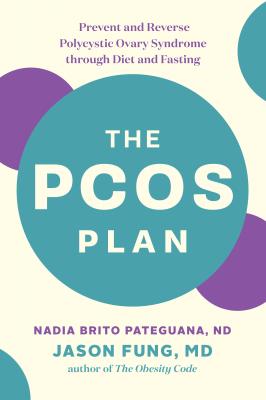ТОП просматриваемых книг сайта:
The PCOS Plan. Jason Fung
Читать онлайн.Название The PCOS Plan
Год выпуска 0
isbn 9781771644617
Автор произведения Jason Fung
Жанр Здоровье
Издательство Ingram
Contents
.................
Introduction: The Many Faces of Polycystic Ovary Syndrome
Part 1: What Is Polycystic Ovary Syndrome?
Chapter 1: The Diabetes of Bearded Women
Chapter 2: The PCOS Spectrum: What PCOS Is and Is Not
Part 2: PCOS and the Role of Hormones
Chapter 4: What We Know about Obesity
Chapter 5: Insulin: The Common Link between PCOS and Obesity
Chapter 6: Insulin and Hyperandrogenism
Chapter 7: Insulin, Polycystic Ovaries, and Anovulation
Chapter 8: Understanding the Roots of Insulin Resistance
Chapter 9: Medications and Surgery
Chapter 10: Low-Calorie Diets and Exercise
Part 4: How to Effectively Treat PCOS
Chapter 11: The Optimal Diet for PCOS
Chapter 12: Practical Advice and Recipes for Women with PCOS
Notes
INTRODUCTION
The Many Faces of Polycystic Ovary Syndrome
.................
I HAVE A REPUTATION for getting people pregnant. In fact, people often seek me out specifically because they’ve heard from friends or co-workers: “Be careful. Don’t go see Doctor Nadia unless you want to get pregnant.” For couples living with fertility trouble, getting pregnant is a welcome miracle! I’ve now been a naturopathic doctor in clinical practice for more than 15 years, and my special focus is on helping women with polycystic ovary syndrome (PCOS) overcome infertility through dietary modifications.
PCOS is the most common reproductive disorder in the world. It affects an estimated 8 to 20 percent of women of reproductive age globally, depending upon the specific diagnostic criteria used.1 Forty percent of patients diagnosed with PCOS suffer from infertility, and 90 to 95 percent of women in infertility clinics who cannot conceive due to lack of ovulation suffer from PCOS.
But my near-obsession with PCOS, fertility, and diet is not merely professional, it’s also deeply personal. I became a naturopathic doctor after developing irritable bowel syndrome as a young adult. Conventional medicine did not help, but I found some reprieve with naturopathic medicine. In 2004 I graduated from the Canadian College of Naturopathic Medicine and moved back to my home country of Mozambique, planning to work with the Ministry of Health in impoverished communities. I hoped to learn local traditional medicine to complement my naturopathic training. However, Mozambican politics are complicated and getting a job at the Ministry is not simple. I knocked on many doors, but I was repeatedly (and sometimes not so politely) turned away.
Eventually I requested a meeting with the Minister of Health himself, and after reviewing my curriculum vitae and listening to my story, he awarded me a license to practice naturopathic medicine privately. He advised me to go to Maputo, the capital of Mozambique and the city where I was born, where he said I would likely do well. I felt defeated that I couldn’t follow my original plan, but with little alternative, and unwilling to turn my back on Mozambique, I did as he suggested.
I was initially worried that I had little to offer. To my surprise, though, my practice was completely full within six months. Instead of treating the poor and undernourished, I had clients who were affluent and overweight. They suffered from many of the same diseases affecting people in the Western hemisphere—the so-called “diseases of civilization,” including type 2 diabetes, cardiovascular disease, cancer, and metabolic syndrome. They were suffering from “Western” diseases because their diet was modeled on the standard American diet, and their dominant concern was weight loss.
Mozambique, at the time, was considered the poorest country in the world and had some of the highest rates of malnutrition. But where rural people were starving, urban dwellers were overfed. Fast-food restaurants such as KFC and pizza joints had invaded the cities, and Coca-Cola was everywhere! From its inception, my medical practice focused almost exclusively on nutrition, diet, and weight loss.
My naturopathic training had not truly prepared me for this situation because I’d studied only a little nutrition, but as the only naturopath in Maputo, I tried my best. I created diet plans for my clients, based on my medical training and common sense. Mozambicans are a wonderful and forgiving people, and they were willing to try anything I suggested. I was very thin, and they believed what I was eating must have something to do with my low body weight.
I now realize that my diet was not particularly healthy and that my thinness might have been the result of genetics and the fact that I was a very picky and poor eater. As a child, I disliked meat and vegetables, so I snacked all day long. I lived on candy, fruit, bread, lattes loaded with sugar, and Coca-Cola. If I sat down for a meal with my family, I ate refined grains with a bit of the sauce, washed it down with a Coke, and followed that with some fruit. At night I went to bed with my bag of candies, and in the morning I started the day with a latte and toast. Only a couple of hours later, I would feel shaky and eat fruit or some more candy. I always believed that I suffered from hypoglycemia, or low blood sugar, so eating sugar every few hours seemed to make sense. Little did I know that in 30 years I would develop metabolic syndrome. Only then would I learn to eat a proper meal.
Among my first patients in this small and tightknit community in Mozambique was a South African woman named Charise who wanted to lose weight. She had a long-standing addiction to soda drinks and wanted to “detox,” so I counseled her on a diet

